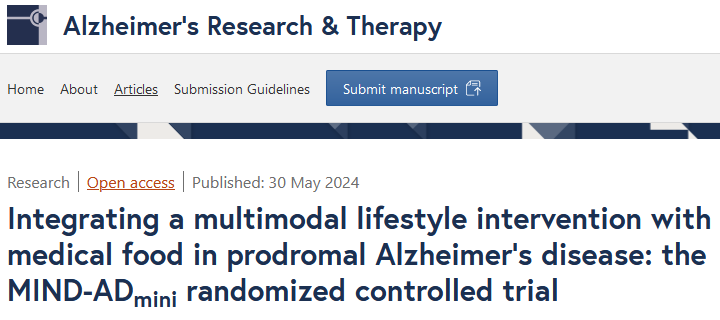The multinational MIND-ADmini trial demonstrated for the first time that a multidomain lifestyle intervention, alone or combined with medical food, is feasible and beneficial for persons with early (prodromal) Alzheimer’s disease. The intervention was safe, well-adhered, with the lifestyle+medical food group showing a reduced rate of cognitive-functional decline after 6 months. The study was recently published in the Alzheimer’s translational research journal, Alzheimer’s Research and Therapy.
The MIND-AD trial
MIND-ADmini was a 6-month multinational (Sweden, Finland, Germany, France) proof-of-concept randomised controlled trial. Participants were 60–85 years old, had very early (prodromal) Alzheimer’s disease and not-well managed vascular/lifestyle risk factors. The trial had three arms, where participants were randomly assigned: multidomain lifestyle intervention based on the FINGER model (nutritional guidance, exercise, cognitive training, vascular/metabolic risk management and social stimulation); multidomain lifestyle intervention+medical food (Fortasyn Connect); and regular health advice/care (control). The primary outcome was feasibility of the multidomain intervention, evaluated by recruitment rate during a 6-month recruitment phase, overall adherence in each intervention arm, and 6-month retention rate. Successful adherence was pre-specified as attending ≥40% of sessions/domain in≥2/4 domains (lifestyle intervention), and consuming ≥60% of the medical food (lifestyle intervention+medical food). The secondary outcomes included adherence/ participation to each intervention component and overall adherence to healthy lifestyle changes, measured using a composite score for healthy lifestyle. Cognitive and functional assessments were included as exploratory outcomes, using the Clinical Dementia Rating scale-Sum of boxes (CDR-SOB).
MIND-AD main results
A total of 93 individuals were randomised (32 lifestyle intervention group, 31 lifestyle+medical food, and 30 control group). Overall recruitment rate was 76.2% (64.8% during the first 6 months). Overall 6-month retention rate was 91.4% (lifestyle intervention 87.5%; lifestyle+medical food 90.3%; control 96.7%). Domain-specific adherence in the lifestyle intervention group was 71.9% to cognitive training, 78.1% exercise, 68.8% nutritional guidance, and 81.3% vascular risk management; and in the lifestyle+medical food group, 90.3% to cognitive training, 87.1% exercise, 80.7% nutritional guidance, 87.1% vascular risk management, and 87.1% medical food. Compared with control, both intervention arms showed improvements in terms of healthier diet. The lifestyle+medical food group also showed significant reduction of cardiovascular risk (P=0.043) and reduced rate of cognitive-functional decline (P<0.005), measured with CDR-SOB.
Risk reduction of Dementia: it is never too late!
MIND-ADmini builds on the successful results and experience of the pioneering Finnish Geriatric Intervention Study to Prevent Cognitive Impairment and Disability (FINGER,Lancet 2015), which earlier showed cognitive benefits from a multidomain lifestyle intervention in at-risk older people from the community. In parallel, the LipiDiDiet trial highlighted clinical benefits of medical food (Fortasyn Connect) in people with prodromal Alzheimer’s disease. However, the feasibility and impact of multidomain interventions combining lifestyle with medical food in prodromal Alzheimer’s disease has not been studied earlier.
“MIND-AD has been a natural next step to combine two successful approaches – non-pharmacological and medical food – and test their feasibility and potential synergy in people who already experience cognitive symptoms due to Alzheimer’s disease. The encouraging results of MIND-AD pave the way to design larger clinical trials investigating longer-term cognitive and other health benefits of combined non-pharmacological and pharmacological approaches.” says Professor Miia Kivipelto from Karolinska Institute and FINGERS Brain Health Institute, who led both MIND-AD and FINGER trials, the EU-FINGERS project and is the scientific leader of the World-Wide FINGERS network of multidomain trials for risk reduction of dementia.
Another newly published study in the Alzheimer’s Research and Therapy journal demonstrated positive effects of more intensive lifestyle changes in patients with mild cognitive impairment or early dementia due to Alzheimer’s disease. The clinical trial was led by Dr. Dean Ornish from the Preventive Medicine Research Institute and University of California, San Francisco, together with a team including Prof. Miia Kivipelto. The trial enrolled 51 participants for a 20 week intervention period, comparing an intensive multidomain lifestyle intervention with standard care approach. Main results indicated cognitive and functional benefits in the participants engaging in the multidomain intervention.
“These findings add to the growing body of evidence that moderate multimodal lifestyle changes may help reduce the risk of Alzheimer’s disease or slow its progression, and also suggest that more intensive multimodal lifestyle changes may have additional benefits for improving cognition in people with early Alzheimer’s disease”, pointed out Professor Alina Solomon from the Brain Research Unit at University of Eastern Finland, Scientific Coordinator for the MIND-ADmini trial.
Funding
MIND-AD trial was supported by the EU Joint Programme – Neurodegenerative Disease Research (JPND) and the following JPND projects EU-FINGERS and Multi-MeMo.


